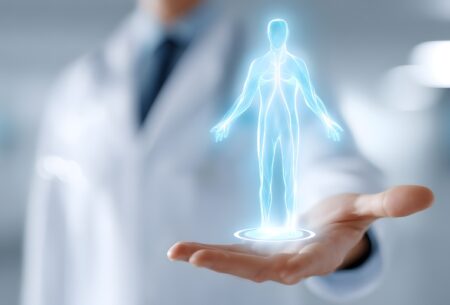It’s estimated that currently 1.25 million people in the UK live with eating disorders which is a serious mental health condition. There are many types such as Anorexia Nervosa, Bulimia Nervosa, Binge Eating Disorder, and Avoidant Restrictive Food Intake Disorder (ARFID).
Along some people’s journey with an eating disorder, they may find experience unpleasant gastrointestinal symptoms. These symptoms may start when dietary changes are first made early on before the person realises they’ve begun eating disorder behaviours. These symptoms may then encourage further dietary changes and without the right support they may make unnecessary changes and the slippery slope continues. For others, they may only experience uncomfortable digestive symptoms when they’re actively trying to recover. Everyone’s recovery journey and the struggles they face is different; we understand that managing unpleasant gut symptoms adds to what is already a challenging time. Some gut discomfort along your recovery is normal and while there is still much to be learned about gut disorders in those with eating disorders, please know that there is support available for you to feel as well as you can.
What digestive symptoms can occur in eating disorders?
Much like some conditions like Irritable Bowel Syndrome and Inflammatory Bowel Disease, symptoms in those with eating disorders can include:
- Abdominal pain
- Bloating
- Distension
- Constipation
- Diarrhoea
- Excess flatulence
- Acid reflux
- Excess belching
- Feeling overly full after eating
- Nausea
The severity of these symptoms can vary for lots of reasons e.g. how your gut health was before your eating disorder, how long you’ve had your eating difficulties, and the specific eating or exercise behaviours that come with your illness.
What causes the symptoms?
There are many factors thought to influence the development of unpleasant digestive symptoms in those with eating disorders. If we’re speaking about the sudden development or worsening of these symptoms, then it’s mainly down to the unhelpful food behaviours (and sometimes food choices) which creates different effects on our digestive system. Some of these changes can happen quickly and some of them are more gradual.
Malabsorption of diet-foods
‘Diet’ or sugar-free products often contain sweeteners like xylitol, sorbitol, mannitol, which are poorly absorbed. When we over-consume these it causes water to enter our small intestine and expand which may feel uncomfortable in someone with a sensitive gut. The sweeteners then pass into the colon where our bacteria ferment them to produce gas which can cause bloating, distension, and flatulence. Some people also experience diarrhoea.
Note: Sometimes people with an eating disorder who develop worsening gut symptoms think that they’re malabsorbing other foods such as lactose or gluten. This is highly uncommon and medical professionals strongly advise against cutting these out, it could make you more unwell in the long term.
Manipulation of fullness signals through unhelpful diet choices
Basing our diet mostly on low energy vegetables or fruit, and/or diet products, with little else, can mean our body sends its fullness signals even though we’re not giving it the nourishment it needs. When we then try to include the nutritious foods our body needs, like protein-rich animal or plant options, complex carbohydrates, and nourishing fats, our body is likely to send signals that it’s too full and we may experience nausea and abdominal pain.
A change in the balance of gut bacteria
We know that certain gut bacteria are linked with more beneficial gut function. When we restrict our eating, in total volume and also excluding particular food groups, we can negatively alter the balance of gut bacteria which is called dysbiosis. This can happen with or without changes to our body weight.
Dysbiosis is linked to symptoms like abdominal pain, bloating, and flatulence. Taking probiotics is not enough to help relieve your gut symptoms when you have an eating disorder and it’s important to get support overcoming the underlying unhelpful behaviours to improve gut and overall health.
Gut-brain axis communication
There is two-way communication between our body’s brain and gut through various nervous systems. These signals influence how our gut moves, how sensitive it is, and how much it self-lubricates.
Those with eating disorders often experience fear around food to various degrees and when we’re in a highly stressed state our gut-brain axis communication is affected which can trigger unpleasant gut symptoms.
Losing muscle mass and strength in the digestive tract and pelvic floor are common in eating disorders
The muscles in our gut and pelvic floor help control the movement of nutrition through our digestive system from one end to the other. Through severe under-eating (often called food restriction) and unhealthy weight loss, these muscles weaken, and our body can struggle to move everything through. Taking frequent and large doses of stimulant laxatives can dilate the colon and slow its contractions. Over-exercising can also slow the movement of food through our gut. Fluid restricting makes it harder for the food to pass through our digestive system.
These all result in food fermenting for longer in our gut which creates lots of gas. The excess gas puts pressure on the walls of our gut and may cause pain and fullness. People might get excess flatulence. In some cases, people can be constipated and experience ‘overflow diarrhoea’ where watery stools are passed which flow around and past the hard stools.
The lower oesophageal sphincter is a ring of muscle between the oesophagus and stomach that closes and opens to let food through to the stomach without letting the acid out. For those who have large binges or purge by vomiting, this can weaken the sphincter and cause acid reflux.
How can these symptoms in eating disorders be managed?
Not everyone with an eating disorder will develop unpleasant gut symptoms. The severity and duration of them can vary too. The advice for your symptoms should be tailored to your specific history and current needs, there truly is no ‘one size fits all’.
It’s a challenging road to navigate and one that requires expert care. The best practice is to seek support from your medical team and to include a dietitian to ensure you’re nourishing yourself safely and in a way that feels as manageable as possible. This is something that I specialise in here at The Gut Health Clinic so please do get in touch if you’d like to make an appointment with me.
If you or someone you care about would like extra information about eating disorders, the eating disorder charity BEAT has lots of helpful resources including how to seek a diagnosis and treatment: https://www.beateatingdisorders.org.uk/
Resource/reference
Full article https://www.ncbi.nlm.nih.gov/pmc/articles/PMC6950592/pdf/nutrients-11-03038.pdf












